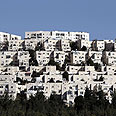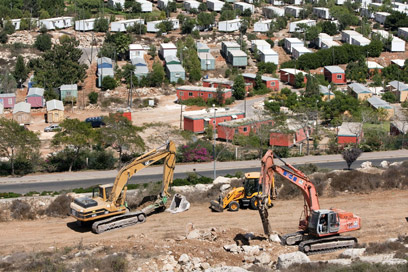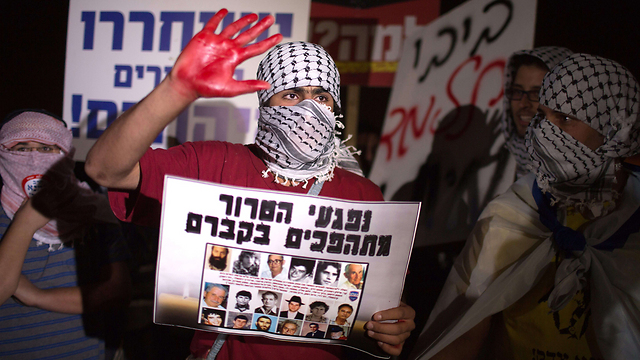
Palestinians: Israel 'destroying peace process' with new housing
After news broke of Israel's intention to build additional 1,500 housing units, Palestinians slam move, claiming it 'leads Palestinian, Arab parties to lose confidence in Israeli government's intention to make peace'
Plans to build the homes in the city's Arab sector came to light almost immediately after Israel began freeing 21 prisoners to the West Bank and another five to the Hamas-run Gaza Strip overnight.
Related stories:
- Israel pushes for additional 1,500 units in settlements
- Peace Now: Israel steps up settlement housing starts
- Second group of Palestinian prisoners released
The sequence was almost a mirror image of August 13, when a first tranche of 26 prisoners was freed and Israel announced construction of more than 2,000 new settler homes, mostly in east Jerusalem.

Construction in West Bank (Photo: AFP)
Palestinian President Mahmoud Abbas's spokesperson, Nabil Abu Rudeina, said the move "destroys the peace process and is a message to the international community that Israel is a country that does not respect international law.”
And a statement from the presidency said it "leads the Palestinian and Arab parties to lose confidence that this (Israeli) government will make peace," the official WAMA news agency reported.
"All settler activities are illegal and no settlement will remain on Palestinian soil," it added.
Earlier, a senior official told AFP that Prime Minister Benjamin Netanyahu and Interior Minister Gideon Saar had "agreed on four building plans in Jerusalem."
The announcement was timed to trump headlines focusing on the celebrations in the West Bank and Gaza after the prisoners walked free into their respective home territories shortly after 1:00 am.
In the West Bank, thousands of cheering people turned out to welcome home the 21 prisoners, who were tasting freedom for the first time in 20 years or more, in a formal ceremony at Abbas's presidential compound in Ramallah.

Protest against prisoners' release (Photo: AFP)
All 26 prisoners were convicted of killing Israelis, with most of the attacks occurring before the 1993 Oslo Accords , which granted the Palestinians limited self-rule but failed to usher in an independent state.
Earlier this year, Netanyahu agreed to release 104 prisoners in stages in a move that facilitated a return to direct talks in late July, ending a three-year hiatus.
The first batch was freed on August 13, and a third release of another 26 inmates is planned for December, Palestinian officials said. The final group is to be freed in March.
The peace talks are being conducted under a US-imposed media blackout, but a senior Palestinian official said Tuesday that Israel had adopted hardline positions and negotiations had so far produced "no tangible progress."
"The current Israeli negotiating position is the worst in more than 20 years," said Yasser Abed Rabbo, secretary general of the Palestine Liberation Organization.
The prisoner release has sparked tensions within Netanyahu's coalition, with the premier describing the decision to free them as "one of the most difficult" he had ever made.
Defense Minister Moshe Ya'alon expressed similar sentiments.
"In recent months we have been facing sensitive diplomatic circumstances and weighty strategic considerations which require us to take difficult and painful steps," he said Tuesday. "It is not a black and white situation. It is highly complex and obliges us to be prudent and responsible, to see also the long view."
- Receive Ynetnews updates directly to your desktop










